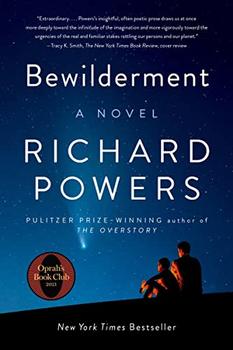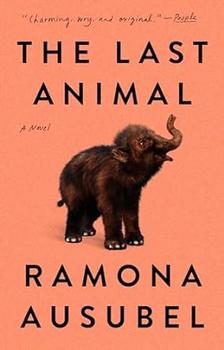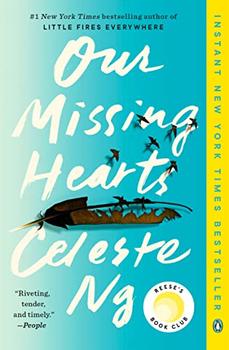Summary | Excerpt | Reading Guide | Reviews | Beyond the book | Read-Alikes | Genres & Themes | Author Bio

A Novel
by Richard PowersIn 2019, Richard Powers won the Pulitzer Prize for The Overstory, a sprawling novel whose characters are obsessed with protecting magnificent trees. Although his follow-up, Bewilderment, has just as much of an environmentalist conscience, its scope is more intimate. It focuses on the experiences of one family and is narrated as a first-person retrospective by Theo Byrne, an astronomy professor at a midwestern university who models earthlike planets in the search for extraterrestrial life. His wife, Alyssa, died in a car accident two years ago. Their volatile nine-year-old son, Robin, named after his mother's favorite bird, is on the autism spectrum and has been violent towards his father and schoolmates.
Father and son journey together in memory and imagination as well as in real life. They connect during time spent in nature: hiking in the woods of the Great Smoky Mountains, swimming in streams and watching birds. For bedtime stories, Theo alternates between anecdotes about Robin's mother, who was an animal rights lawyer, and tales of exoplanets, some of them borrowed from the plots of his extensive science fiction collection. Robin is fascinated by plants and animals, and his father encourages his curiosity.
Theirs is a cozy, comforting relationship, a cocoon of safety after the loss of Robin's mother. But as the novel goes on, the outside world starts to intrude. In this alternative near-future scenario, perhaps one in which the 45th president was re-elected, the funding for Theo's project is at risk and political dissidents are being locked up. Meanwhile, news about the accelerating environmental crisis has Robin increasingly on edge. Angry after hearing a rumor about his mother, he throws a metal thermos at a friend and breaks the boy's cheekbone.
Theo, under renewed pressure from the school to put Robin on mood-altering medication, tries a different tactic. Alyssa's friend Martin Currier researches decoded neurofeedback, a way of locating emotional states in the brain and, through artificial intelligence, giving subjects empathy targets to work toward. She and Theo had volunteered to model emotions for the study and their results are still on file. Currier proposes enrolling Robin in a series of neurofeedback sessions in an fMRI scanner. These are a little like mindfulness training, but because they involve interacting with his mother's recording from years ago, they are also almost like spending time with her again. Robin shows tremendous progress; with his mood now on an even keel, he can have calm dealings with his father and classmates. The case is such a success that Currier reports it to the national news, and Robin becomes the subject of a viral documentary.
Powers is in full control of his myriad themes and packs a lot into 200-some pages. The plot leaps between spheres: between the public eye, where Robin is a scientific marvel and an environmental activist (see Beyond the Book), and the privacy of family life; between an ailing Earth and the other planets Theo can study or imagine; and between the humdrum of daily existence and the magic of another state where Robin can reconnect with his late mother. Within the limited timespan of a school year, much changes for Robin, but regression threatens. The novel opens at the Great Smokies, and returns there for a dramatic finale. I admired this full-circle structure, and the way in which other incidents meaningfully repeat.
In an author's note, Powers discusses his inspirations for the novel. One was his nephew, who loved nature and might have benefited from decoded neurofeedback. Another was the growing feeling of solastalgia, especially among young people. The third was Daniel Keyes's Flowers for Algernon (1959), a sci-fi classic Powers first read at age 11. Theo and Robin listen to it during their Great Smokies road trip. (The plot of Bewilderment apparently draws on that of Flowers for Algernon. If you've read it, you may have an inkling of what's coming; if you haven't, it's probably best not to read up on it unless you're not concerned about spoilers.)
When I came to the breathtaking final paragraph of Bewilderment, I felt despondent and overwhelmed. I wasn't sure I could forgive Powers for the ending. But as time has passed, the book's feral beauty has stuck with me, and Robin in particular won't leave my mind. His neurodivergence, viewed as a problem by authority figures in the novel, seems to allow him greater communion with other species, and perhaps even with the dead. The pure sense of wonder that Robin embodies is worth imitating. For while "bewilderment" connotes the confusion of modern life, it also suggests the value of embracing wild creatures and places. As Powers writes in the prefatory note, "A childlike love for our wild, entangled home is the only thing large enough to cure what is wrong with us."
![]() This review was originally published in The BookBrowse Review in September 2021, and has been updated for the
November 2022 edition.
Click here to go to this issue.
This review was originally published in The BookBrowse Review in September 2021, and has been updated for the
November 2022 edition.
Click here to go to this issue.

If you liked Bewilderment, try these:

by Ramona Ausubel
Published 2024
A playful, witty, and resonant novel in which a single mother and her two teen daughters engage in a wild scientific experiment and discover themselves in the process, from the award-winning writer of Sons and Daughters of Ease and Plenty

by Celeste Ng
Published 2023
From the #1 bestselling author of Little Fires Everywhere, comes one of the most highly anticipated books of the year – the inspiring new novel about a mother's unbreakable love in a world consumed by fear.
If we did all the things we are capable of, we would literally astound ourselves
Click Here to find out who said this, as well as discovering other famous literary quotes!
Your guide toexceptional books
BookBrowse seeks out and recommends the best in contemporary fiction and nonfiction—books that not only engage and entertain but also deepen our understanding of ourselves and the world around us.